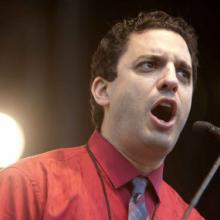freedom of religion
EXCEPT FOR ABRAHAM LINCOLN and Thomas Jefferson, every president of the United States was or is a professing Christian.
Only in the case of John F. Kennedy, it seems, has a president’s Christian faith counted against him in the opinion of a significant number of citizens, and in Kennedy’s case it was because he was Catholic rather than Protestant. The Christian belief of public officials in any branch of national, state, or local government hardly ever raises concern among the U.S. public. But the opposite is true when it comes to Muslim officials.
Many conservative Americans say they fear that the U.S. will become a nation influenced by Islamic tenets instead of Christian ones. Commentators on Fox News often express alarm about sharia (Islamic law). Jeanine Pirro, host of the network’s Justice with Jeanine Pirro, accused Rep. Ilhan Omar, D-Minn., a Muslim woman of Somali descent, of supporting Islamic rule in the United States. Omar and Rep. Rashida Tlaib of Michigan are the only two Muslim women ever elected to Congress, and two of the three Muslims ever to serve in the U.S. legislature; Twitter users criticized Omar for wearing a hijab and Tlaib for wearing, at her congressional swearing-in, a traditional Palestinian dress called a thobe, made by her mother. Another Fox News host, Pete Hegseth, said that, based on how Tlaib “talked about President Trump having a hate agenda, I could, therefore, look at her and say that she has a Hamas agenda.” The Associated Press had to debunk the claim that Tlaib’s thobe was a “symbol of Hamas terrorists,” a sign that many Americans may have believed it to be true.
The alienation and hate go even further. A Florida Republican politician said in a fundraising email that falsely claimed that Omar worked for the nation of Qatar, “We should hang these traitors where they stand.” Another man called Omar’s office and said he would “put a bullet in her skull.” Following the Jan. 6 insurrection at the U.S. Capitol, when lawmakers were still in the building trying to certify President Joe Biden’s election, Tlaib discussed on the House floor her constant fear due to the death threats she regularly receives.
“I worry,” she said, “every day.”
People of faith outside conservatism have taken up the fight for religious freedom in a wide variety of contexts.
As far back as the early 19th century, Catholic students and other religious groups were sometimes whipped, beaten, and worse, for not participating in prayer and Bible reading in the common schools, a predecessor to the public schools.
ONE SPACE WHERE I find rest, amid the noise of living and working in Washington, D.C., sits directly in the heart of the hustle: the Newseum, dedicated to the defense of Amendment 1 to the U.S. Constitution.
It may be an odd choice, since it exhibits the front page of 60 newspapers each morning, each listing the harrowing headlines I’m trying to escape. But in this space, dedicated to education on our First Amendment freedoms, I find special solace.
Etched on a large window overlooking Pennsylvania Avenue between the White House and the Capitol are these words: “Freedom of Press Speech Religion.”
There is not much breathing room between those freedoms inherent to all Americans, nor between those listed separately: freedom of assembly and petition.
It’s a well-placed reminder about freedoms many Americans take for granted. In 2016, 39 percent of Americans could not name a single one of them. Fifty-four percent could name freedom of speech, but only 17 percent and 11 percent could name freedom of religion and freedom of the press, respectively.
When freedoms don’t “feel” threatened, it’s easy to take them for granted.
Enter 2017. Already this year, we’ve experienced attacks on the freedom of religion as evidenced by the surge in Islamophobic and anti-Semitic attacks and the Trump administration’s failure to mention Jews or anti-Semitism in its Holocaust Remembrance Day statement (a stark departure from the previous six administrations). We’ve seen lawyers spill pro bono hours in airports defending the freedom of religion by enforcing legal protections for international travelers in the face of what appeared to be a “religious test” for entering the country.
People of faith across the U.S. and across party lines rightly have been outraged at potential infringement of religious liberty under the Trump administration.
Speaking to members of Parliament on Wednesday, Spielman reiterated her concerns about religious extremism in English schools and said her inspectors had found in some private Islamic schools that children had been shown films of people being beheaded and that they had been taught that it is acceptable for men to beat their wives.
A three-judge panel of the San Francisco-based 9th U.S. Circuit Court of Appeals partially granted a Trump administration request to block at least temporarily a judge's ruling that had put the new ban on hold. Trump's ban was announced on Sept. 24 and replaced two previous versions that had been impeded by federal courts.
All eyes should be on Justice Anthony Kennedy. At 81, Kennedy is the longest-serving, second oldest justice on the court and is a conservative — except when he’s not.
Kennedy has sided with the court’s more liberal justices on several landmark cases, as he did in Obergefell v. Hodges, the 2015 decision that made same-sex marriage the law of the land. But he also sided with the conservative judges in Burwell v. Hobby Lobby, a ruling that the Christian-owned chain of craft stores could deny contraception coverage.
More than half of Americans surveyed — 53 percent — believe undocumented persons have no constitutional rights when, in actuality, they do.

Image via stockfotoart/Shutterstock.com
Germany has no plans to introduce an "Islam law'"codifying the rights and obligations of Muslims, a government spokesman said on April 3, dismissing an idea floated by allies of Chancellor Angela Merkel ahead of federal elections in September.
Merkel, who will seek a fourth term in what is expected to be a close-fought ballot, has come under fire for opening Germany's doors to refugees, more than one million of whom — mostly Muslims — have entered the country over the past two years.
Despite President Trump’s threat of a “Muslim ban” during the 2016 campaign, Hadil Mansoor Al-Mowafak, a 20-year-old international affairs student at Stanford University, was taken aback when he banned travel from seven Muslim countries, including Yemen, where her husband lives.
“I didn’t think it was even possible,” Al-Mowafak said. “I thought he just used the Muslim ban during his campaign, and once he took power he’d face reality.”
President Donald Trump vowed to make good on a campaign promise to repeal the law that restricts political speech from the pulpit, speaking at his first National Prayer Breakfast as president.
“I will get rid of, totally destroy, the Johnson Amendment, and allow representatives of faith to speak freely and without fear,” he said on Feb. 2 to a gathering of 3,500 faith leaders, politicians, and other dignitaries from around the world, including King Abdullah of Jordan.
A teenage blogger from Singapore has been found guilty of insulting Christians and of distributing an obscene image of the country’s founding father, Lee Kuan Yew, and former British Prime Minister Margaret Thatcher.
Amos Yee, 16, had faced three years in prison, but will be put on probation instead, the Associated Press reported.
He was released on a bail of 10,000 Singapore dollars ($7,400).
The Kenya Conference of Catholic Bishops is facing a lawsuit over the cancellation of a rental contract for a restaurant operated by a Somali Muslim.
Al-Yusra Restaurant Ltd. had signed a six-year lease starting in 2013 to operate a restaurant in a section of Waumini House where the bishops’ conference is based. Baakai Maalim, a Somali Muslim, is a director for the company.
This week’s Supreme Court ruling allowing sectarian prayers at public meetings dealt a body blow to atheist organizations.
That was the assessment of David Silverman, president of American Atheists, speaking Tuesday to a group of nonbelievers at Stanford University. He then described a scenario that may raise eyebrows among some atheists: working with religious groups to fight against the ruling.
That’s a change for a man who has famously described religion as a “poison.” And it is emblematic, observers say, of the change that may result from the majority opinion in Greece v. Galloway, which found that prayers citing “the blood sacrifice of Jesus Christ” are permissible before government business.
Other secularists are likewise convinced that now is the time for atheists to join forces with members of minority faiths.
Sentenced for professing his atheism, Alexander Aan was recently released after 18 months in an Indonesian prison.
Masood Ahmad has already served over two months in a Pakistani prison for reading the Quran as an Ahmadi Muslim.
Pastor Saeed Abedini languishes in an Iranian prison for preaching Christianity.
They are but a sliver of the ongoing persecution, including murders, of Ahmadi Muslims, Shiite Muslims, Christians, Hindus, and atheists at the hands of extremists claiming Islam requires death for apostasy and blasphemy.
Bio: "Khaipi" (real name withheld) is a peace studies professor in Thailand and a Chin religious freedom activist who served as researcher for the Chin Human Rights Organization's 2012 report detailing abuses against ethnic and religious minorities in Burma.chro.ca
1. What is at the root of the persecution of Christians in Burma?
There is an unwritten policy called “Burmanization,” which means that to be Burmese you have to be a Buddhist and you have to speak Burmese. The Chin people are not allowed to practice Christianity, and we are not allowed to study our own ethnic languages. But it’s not all about religion: They are attacking our ethnic identity because Christianity has become our identity.
Before Christianity came to the Chin people, they practiced an indigenous religion. In this religion, they believed in an Almighty One who created the world. In 1899, the very first American Baptist missionaries came to Chin state, and when they talked about the Christian God, our forefathers could adopt it very easily because it was very close to that indigenous belief. Today, when the Burmese military junta persecutes us, they say, “Okay, we want to take out this kind of Western religion.” But for us, once we believed in God, it became our religion, not a Western religion anymore.
Missourians will vote on Tuesday on a proposed amendment to the state constitution that supporters say would protect residents' right to pray in public. If a recent poll is any indication, it could pass by a mammoth margin.
Supporters say the so-called "right to pray" ballot measure — known as Amendment 2 — better defines Missourians' First Amendment rights and will help to protect the state's Christians, about 80 percent of the population, who they say are under siege in the public square.
Opponents, meanwhile, say that the religious protections Amendment 2 would offer are already guaranteed by the Bill of Rights and the U.S. Constitution, and that it will open the door to all manner of unintended and costly consequences including endless taxpayer-funded lawsuits.
Editor's Note: In celebration of July 4th, and with the hope that this item will be useful to religious communities and candidates during the election season, the Center for Religion and Public Affairs at Wake Forest University Divinity School has re-released this joint statement of current law on religious expression in American public life today (see below). It’s the perfect resource for kicking off informed and civil discussions of religion’s role in public life during this election season.
As candidates and campaigns reach out to people of faith, and religious organizations join the fray over hot topics like the recognition of same-sex marriage in civil law and federal requirements regarding contraception coverage, Americans are once again asking questions about the rules governing religious expression in public life.
To provide Americans with some answers to these questions, a group of national Muslim, Jewish, Sikh and Christian leaders from the evangelical, mainline and Catholic traditions joined with civil liberties leaders to draft “Religious Expression in American Public Life: A Joint Statement of Current Law.” The Center for Religion and Public Affairs at Wake Forest University School of Divinity coordinated the project.
“As the campaign cycle moves toward November elections, the statement provides helpful guidance for tax-exempt organizations about the IRS rules that apply to their political activities,” said Melissa Rogers, director of the Center for Religion and Public Affairs. “It also helps voters understand how the First Amendment applies to the political activities of religious individuals and institutions,” Rogers explained. “The role of religion in public life has long been a source of controversy and litigation. We brought together a diverse group of experts on law and religion to clarify what current law has to say about these matters.”
Sarah Pulliam Bailey at Christianity Today reports:
More than 60 churches that faced possible eviction Sunday from New York City public schools should have more room to breathe. The churches will be allowed to continue to meet in public schools, thanks to a permanent injunction issued today from a district court judge.
An ongoing conflict between religious organizations and the Department of Education kept churches in limbo over the right to keep using public school buildings for worship services. New York City Council speaker Christine Quinn blocked a vote to allow houses of worship access to school property. The resolution saw support from 31 of 51 council members, but the state legislative session ended this week, the Queens Chronicle reported.
Read the full report HERE.
While I believe in the principle of church-state separation, there are times when it is taken too far. Today’s example is a food pantry in Seymour, IN.
















